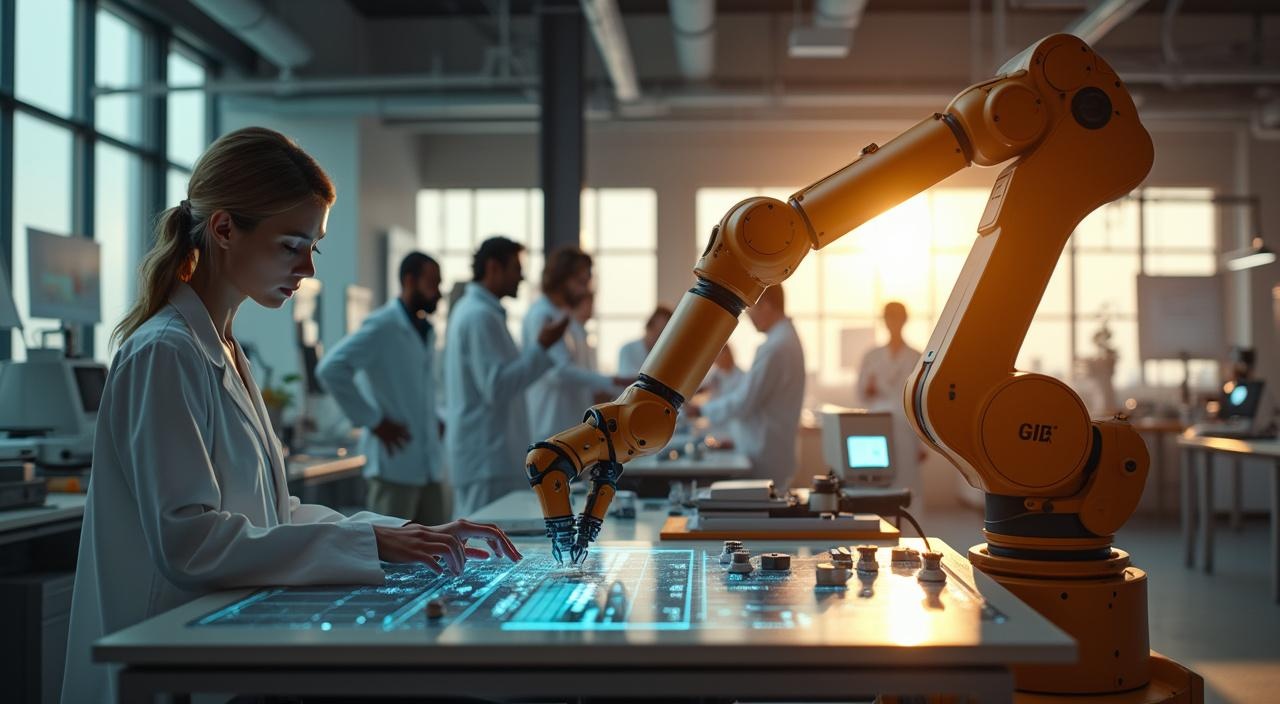The AI revolution is reshaping our professional landscape, transforming how humans and technology collaborate in unprecedented ways. As organizations rush to integrate artificial intelligence, a critical question emerges: Can AI professionals succeed when human insight remains the essential strategic compass?
Key Takeaways:
- Human skills like emotional intelligence, creative problem-solving, and ethical reasoning are becoming increasingly crucial in AI-driven environments
- Technical proficiency alone is insufficient; successful AI integration requires blending technological capabilities with distinctly human insights
- Emerging careers are focusing on human-AI collaboration, with roles like AI ethicists and cultural liaison specialists gaining prominence
- Organizations seeing the most success view AI as an amplification tool rather than a replacement for human talent
- Continuous learning and developing cross-functional skills will be essential for professionals in the AI-transformed workplace
The AI Revolution: A Landscape of Unprecedented Change
The numbers don’t lie. The global AI market has exploded to $391 billion with a staggering 35.9% compound annual growth rate. I’ve watched this transformation unfold across industries, and frankly, it’s breathtaking.
Picture this: 97 million people will be working in AI-related fields by 2025. That’s not just growth—that’s a complete workforce revolution happening in real time.
Here’s what caught my attention: 89% of enterprise-level organizations are advancing generative AI initiatives. This isn’t experimental anymore. It’s mainstream business strategy.
The acceleration reminds me of the internet boom, but faster. Companies that once hesitated are now racing to implement AI solutions. Understanding AI disruption’s impact on entrepreneurs becomes crucial for survival.
Strange but true: we’re witnessing the largest technological shift in human history, and most businesses are still figuring out their strategy.
The Human-AI Skills Divide: More Than Technical Prowess
Pure technical know-how won’t cut it anymore. I’ve watched countless businesses stumble because they focused solely on algorithms while ignoring the human element. The numbers tell a stark story: only 37% of enterprises without formal AI strategy report successful adoption.
Here’s what I learned from transforming multiple businesses: the magic happens when you blend technical capabilities with distinctly human skills. Your team needs empathy to understand user needs, cultural awareness to avoid algorithmic bias, and creative problem-solving to tackle challenges AI can’t anticipate.
The Skills That Make the Difference
Smart companies focus on developing these core competencies in their teams:
- Emotional intelligence to interpret AI outputs contextually
- Cross-cultural communication for global AI deployments
- Strategic thinking to identify where AI adds real value
- Ethical reasoning to guide AI implementation decisions
When organizations integrate both technical and human skills properly, they see productivity gains of 20-30%. AI agents won’t replace you, but professionals who combine technical proficiency with human insight will dominate those who don’t.
Real-World Frontiers: Where Humans and AI Collaborate
I’ve witnessed the transformation firsthand. AI isn’t replacing humans—it’s creating powerful partnerships that neither could achieve alone.
Industry Success Stories
Healthcare leads this collaboration revolution. AI systems analyze medical images with superhuman accuracy, but doctors provide the empathy and nuanced judgment patients need. Radiologists now catch cancers earlier while spending more time explaining results to worried families.
Finance demonstrates another winning formula. AI agents process risk assessments in milliseconds, but humans ensure ethical lending practices and handle complex customer situations that algorithms can’t parse.
Netflix’s $1 billion AI recommendation engine proves the retail potential. The algorithm suggests what you might enjoy, but human content creators still craft the stories that keep you watching.
Manufacturing showcases precision partnerships. AI quality control systems spot defects human eyes miss, yet experienced technicians interpret anomalies and make final judgment calls. This hybrid approach reduces waste while maintaining the craftsmanship that separates premium products from commodity goods.
The Success Formula
Here’s what separates winners from strugglers: 78% of enterprises with formal AI strategies report successful integration. The common thread? They view AI as amplification, not replacement.
Smart businesses automate routine tasks while freeing humans for creative problem-solving. This isn’t just feel-good philosophy—it’s profit-driven pragmatism.
The twist? Companies that embrace human-AI collaboration outperform those attempting full automation. Turns out, the most advanced AI still needs human wisdom to thrive.

Emerging AI Careers: The New Professional Landscape
The job market isn’t shrinking because of AI. It’s expanding in ways we couldn’t predict five years ago.
Recent data reveals 97 million new positions emerging across data science, cybersecurity, and machine learning sectors. Strange but true: AI is creating more opportunities than it eliminates.
The Roles You Haven’t Heard Of Yet
Picture this: companies desperately need AI ethicists to prevent algorithmic bias disasters. Human-AI collaboration designers now architect workflows between humans and machines. Cultural liaison specialists adapt AI systems for global markets.
Here’s the twist: these positions prioritize hands-on experience over traditional degrees. I’ve watched career switchers land six-figure roles after completing targeted bootcamps and building portfolios.
Your Competitive Edge
The good news? AI won’t replace humans who understand human needs. Companies seek professionals who bridge technical capabilities with human insight. Your ability to interpret, contextualize, and apply AI solutions remains irreplaceable.
Start building practical AI skills now. The market rewards those who combine technical literacy with domain expertise.
Navigating the Future: Personal Development Strategies
I’ve watched countless professionals panic when AI enters their workspace. Here’s what separates the thrivers from the survivors: they treat change like a muscle that needs regular exercise.
Build your interdisciplinary portfolio like you’re collecting rare coins. Start with projects that blend your current expertise with emerging fields. I remember when I combined my physics background with business strategy—suddenly, I could speak both languages fluently. That bilingual advantage opened doors I never knew existed.
Cross-functional teams become your laboratory for growth. Jump into projects outside your comfort zone. Marketing meeting product development. Finance collaborating with creative. These intersections teach you how different minds solve problems.
Annual upskilling isn’t optional anymore—it’s survival. Pick one new skill each year and commit fully. Last year, I dove into AI automation for appointment-based businesses. The investment paid off within months.
Four Skills That Future-Proof Your Career
Focus your energy on developing these adaptable capabilities:
- Creative problem-solving – AI handles routine tasks, you handle the impossible
- Cross-cultural communication – Global teams need translators, not just linguists
- Emotional intelligence – Machines can’t read the room like you can
- Systems thinking – Connect dots that algorithms miss
The professionals who thrive understand something simple: AI won’t replace you, but it will change what it means to be you. Start building your interdisciplinary toolkit today. Your future self will thank you.
The Human Factor: Bridging Technology and Empathy
Your technical skills got you here, but they won’t keep you relevant alone. I’ve watched brilliant engineers struggle because they forgot one thing: AI serves people, not algorithms.
The Emotional Intelligence Advantage
Successful AI professionals balance hard skills with soft ones. You need to translate complex concepts for stakeholders who think in business terms, not code. AI Agents Won’t Replace You—But They Might Change What It Means to Be You explores this shift perfectly.
Here’s what separates thriving AI professionals from the pack:
- Active listening during cross-functional meetings
- Explaining technical decisions in human terms
- Anticipating user frustrations before they happen
- Building trust through transparent communication
Ethics as Your North Star
Every algorithm you build affects real people. I’ve seen teams rush to deploy without considering bias or privacy implications. Ethical expertise marketing applies here too. Your reputation depends on responsible development practices that put human welfare first.
Sources:
• Explodingtopics.com AI Statistics Blog
• Aloa AI Industry Insights Resource
• SpringsApps Knowledge AI Statistics 2024
• Elfsight AI Usage Statistics Blog
• St. Louis Fed “On the Economy” Article








